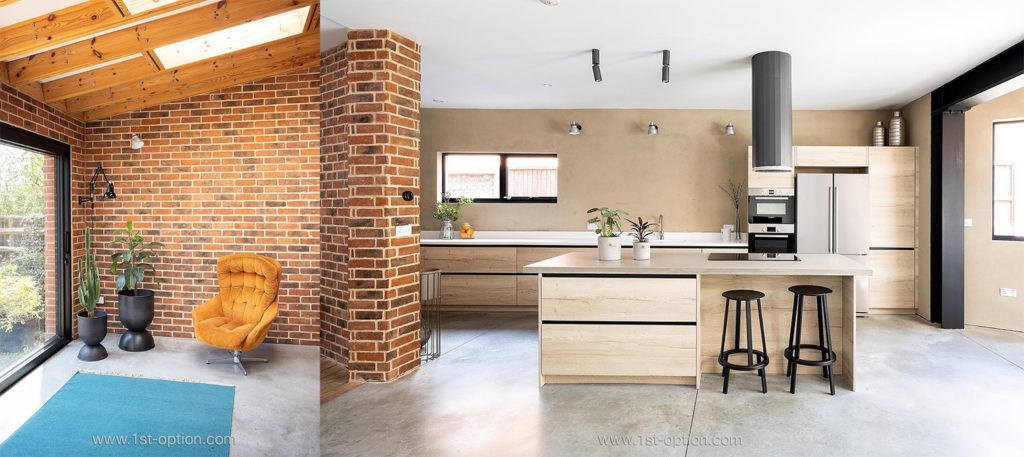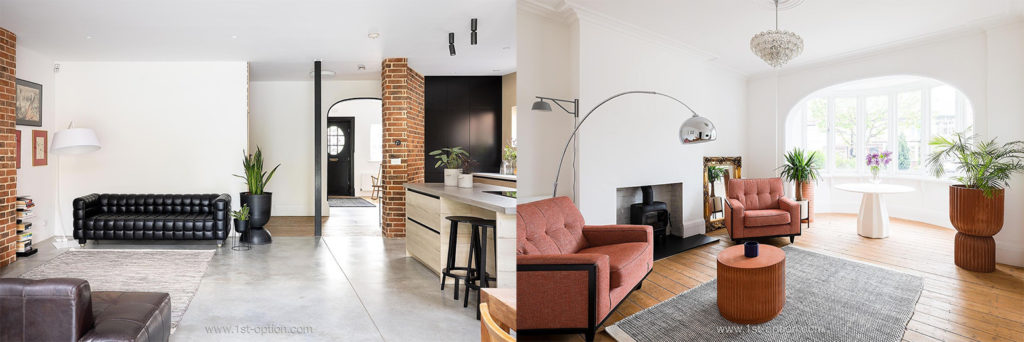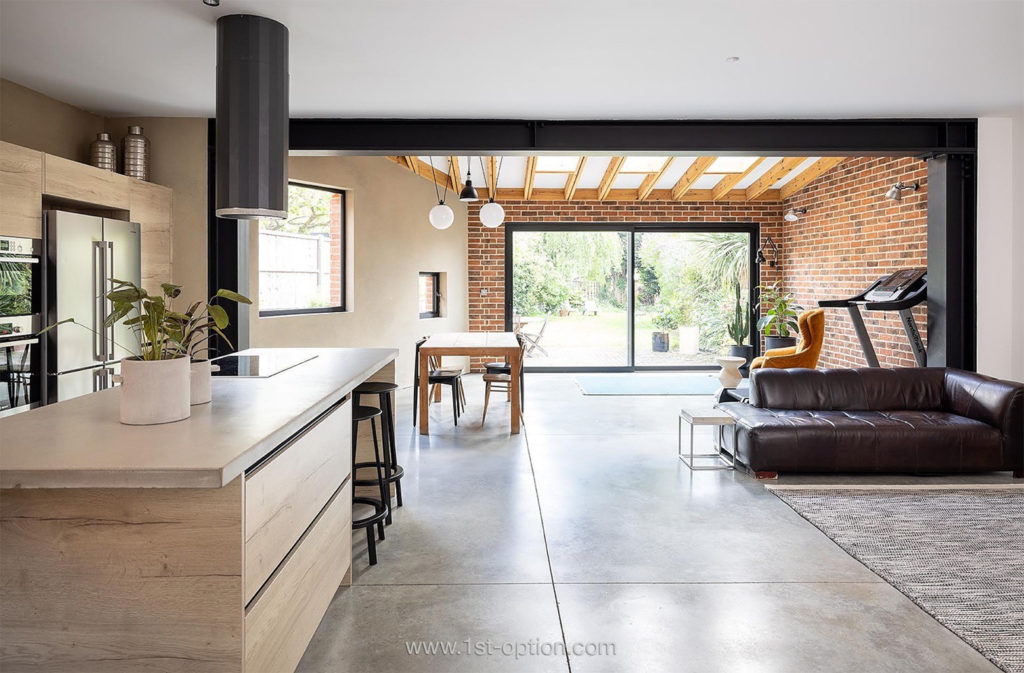Rob – “So, can you talk to me a little about what you’d say your design style is?”
Marta – “I think it’s a bit of a mix between my hometown (which is Barcelona) and the architecture from Barcelona and London, as I’ve been here for twenty years now. Just walking around the cities and taking inspiration from the architecture of both cities.”
“I would say my style is a bit eclectic as I like to mix things. You spotted a few old things upstairs, so there’s a combination of modern furniture and modern features with more traditional pieces, which you have to keep, because London has these old houses, so you have to keep the essence of the house a little bit right?”
Rob – “You don’t want to knock it down and start again, right?”
Marta – “Exactly! There’s no point in knocking a house down to build a new one. If you want to do that, you build a new house from scratch. But if you move into a house you want to keep the essence and history of the house. This house was built in the 1920’s, so we wanted to keep elements of that within it.”
“Lots of my neighbours have actually kept more of the history of the house than I have; I think I’ve been less respectful to the house, as this space is completely different to what you see around the neighbourhood. But I didn’t mind getting rid of a few things that were traditional that I was less interested in.”

Rob – “You have to keep it to your style as well though, don’t you?”
Marta – “Yeah, yeah. And you want to make it functional because at the end of the day, this is a family house and this is where you live, cook, clean, relax etc. So, we want to keep it functional and sometimes traditional is not the most convenient.”
Rob – “Yeah, I mean especially with older houses, you have to think about insulation, can you keep the house warm enough. And more often than not, you can’t.”
Marta – “Absolutely! I think insulation was one of the most important factors for us in the whole renovation process. We took out all the old windows and put new ones in – which was a great decision with everyone talking only about energy prices now. You want to make sure the house is 100% insulated.”
Rob – “What are your biggest influences in design? Any designers or schools of thought you adhere to? There’s definitely a Mediterranean aspect to some of the furniture, especially down here.”
Marta – “Yeah, I think there’s a bit of a Mediterranean flavour, but I think architecture in Barcelona is very modern and contemporary, so I think I’m inspired by contemporary designers. I also look at a lot of websites; I like Nordic websites, but I wouldn’t define this house as Scandi. Perhaps it has a few Scandi elements like the timber, but there’s a lot of Italian as well. The extractor fan above the central island, which is quite fancy is Italian for example.”

Rob – “There are quite a few industrial elements as well.”
Marta – “Yeah, there are a few industrial elements, but I didn’t want to go too industrial because that’s a bit too ‘office Shoreditch style’ for me, and of course it doesn’t make the house comfortable.”
Rob – “Why did you leave Barcelona to come here?”
Marta – “I came here to study; I came to Goldsmiths to do my Masters degree and then met my husband who was also from Barcelona, but he lived in London and that was it really, it’s been 20 years since then and we’ve never looked back. Barcelona is close you know, it’s just two hours by plane; we have a nice place by the sea, so it makes it easy to go back and forth.”
Rob – “It’s one of my favourite cities for sure.”
Marta – “Do you like it? I do like Barcelona, but it’s changed so much. It’s not the city I left 20 years ago. It’s become too touristic and honestly, this year it’s back to what it was like before COVID – it’s just awful, too much! It’s a small city that can’t cope with so many people and what’s happened is that the city has been transformed to serve the tourists first and then the people living there.”

Rob – “I think in some ways I feel like London is a bit similar in terms of it just serves the tourists a bit.”
Marta – “Yeah, but London is huge. When I lived in Barcelona, I used to have a scooter, but now when I’m there because I’m used to London (and I told you I don’t have a car), I walk everywhere because everywhere is walking distance. You can get from one side to the other in around 20 minutes.”
“We don’t actually have our place in Barcelona anymore, we are by the sea, around 20 minutes away; it’s a commuting town, just by the beach, so makes it nicer – we are not in the hub of the city. And it was very hot this year, so would have been quite a challenge in the city.”
Rob – “Moving back to your property a little (sorry, I like to go off on tangents where it feels right). I guess you’ve already touched on it a little, but why did you decide on certain elements within the home? For example, the brick walls, the clay, the concrete, the timber?”
Marta – “So, it was a sort of collaborative process with the architects. Of course, we started with mood boards and I gave them ideas of things I liked, which were I guess not your traditional extension. And then from that, I was actually looking at aluminium panel extensions and they gave me a few options, but ironically the one I liked the most was actually more traditional and that was the red brick.”
“So, we went for the red brick and I guess that sort of set up the theme for how we’ve done the rest of the house. Once we kept the exposed brick, one thing we didn’t want to compromise on was the concrete floor and from here, it sort of led us to choose more natural materials – this sort of then set up the theme with the house. The architects were also very conscious of not letting us make it too industrial; we had to find the balance within a minimalist space, and that’s how we decided on this kitchen, not to make it too black or grey. So, in the end we went with this colour that was more similar to wood and warmer.”

Rob – “That’s really interesting! What’s your favourite area within the house?”
Marta – “What’s my favourite area within the house… I think this open-plan kitchen/ living area. I mean, when you wake up in the morning and come down here, it’s like, oh this is nice. But then, there’s also the front room – because of COVID we changed a lot of things in the house – it used to be a guest room, but it is now my workspace and I quite like it because of the light and because I quite like to work and see what is happening outside day-to-day.”
“I think it’s also good to have two spaces to relax in. That can be one of the challenges that people who only have one space have to think about. If everything is in one place, you don’t have anywhere to go and just escape from your family (which you need sometimes).”

Rob – “Do you do most of your entertaining in here then?”
Marta – “Yeah, and outside. We have the long garden and the weather has been nice this year, so when we have had people round, we’ve done a lot of entertaining outside. But yeah, also in the kitchen, but that’s part of the reason why I want a new table because this is 6 seats, so you can only have maximum 6 people at the table and generally when friends come round, we are 8-10, so we have to move things around.”
Rob – “I guess when you extend the concrete outside, it will be perfect to have friends’ round.”
Marta – “That’s the idea yeah – let’s hope for some more hot summers.”
Rob – “So, what made you decide to become a shoot location owner?”
Marta – “Actually, it was the architect who designed this space. She recommended it and I also have a sister who’s a producer and works in TV. Every time she came round, she would say this space is so good for shoots; the kitchen is quite unique, in that it’s very spacious and it would be very easy to have crews in here. So yeah, I had my sister who works in the sector suggesting it and the architect who said it would be perfect for shoots and she recommended 1st Option.”

Rob – “That was going to actually be my next question – how did you find out about us, but there we go.”
Marta – “Yeah, the recommendation came from the architect as she already knew about your company through another client of hers.”
Rob – “It’s great to hear about our word of mouth.”
“One last question and I’ll get out of your hair. Did you go to the architect with the design brief or did they offer up examples for you? How did the process work?”
Marta – “Well, the house was selected for Open House, so it was great marketing for the architects because it had a lot of people coming round to see their work. This was in 2019, just before COVID, but I think it was a collaborative process in which I showed them images from Pinterest, magazines, things that I liked, places I had seen and taken pictures of. You know sometimes you’re walking round London and you see an extension, something you like and you show them that, so it was a continuous process.”
“The other thing I’d like to say is that the design is never finished. You can’t ever do everything at once. I think what’s nice is as you live in the house, you discover how you use the house and then you keep adjusting how you have things, the things you buy for certain areas etc. It’s a constant process or evolving.”
“In five years’, time this may look completely different. My kids will be older and we’ll have different needs and also different things that you like. It’s an evolution and that’s the nice thing about design – it needs to fit your needs.”

Rob – “That’s amazing, that’s everything from me. Thanks so much Marta, you have been great. Thanks for letting us have a look round your amazing house and we will see you all in the next one.”
